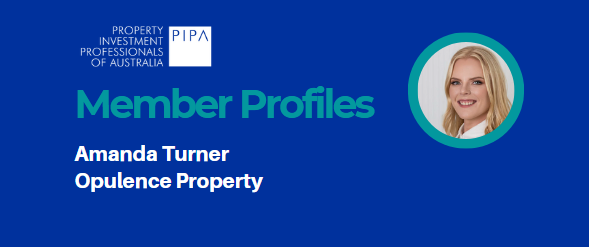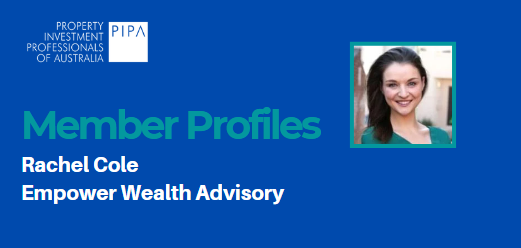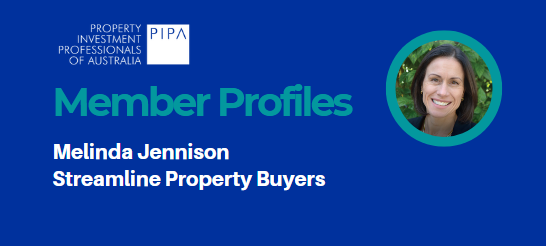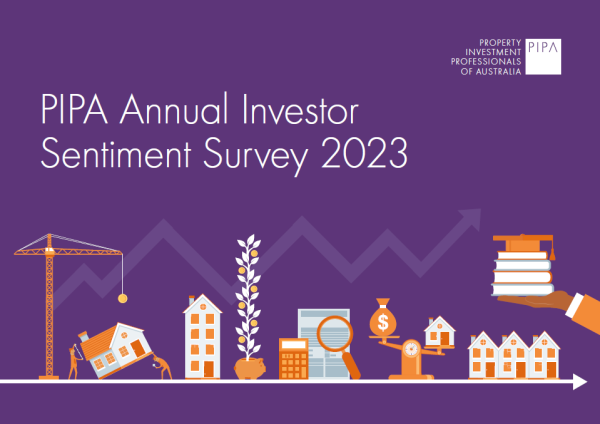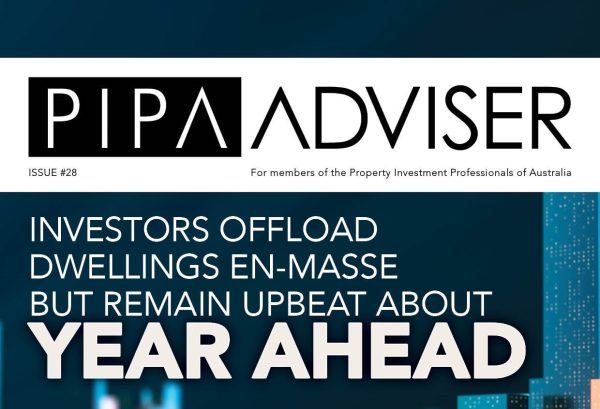PIPA Member Profile | Kathy Blahut, Investment Property PA
Jan 2024Karen Millers
Categories
Location ReportsMedia releasesNational market updatesPersonal advisersPIPA AdviserPIPA Annual Investor Sentiment SurveysPIPA Member ProfilesPIPA video updatesPIPA webinarsPodcastsProperty advisersProperty newsLatest Articles
Location Report – City of Geraldton
Which property cycle are we in?
Rent rises ease but crisis’ link to population density found to be tenuous
Jordan van den Berg: The ‘Robin Hood’ TikToker taking on Australian landlords
Victorian property investors face yet another new property tax as council tests levy
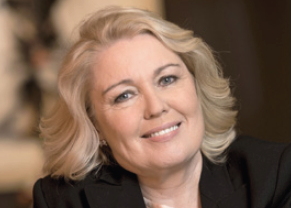
Kathy Blahut started her working life as a high school economics teacher but her passion for property would see her transition into teaching adults how to create wealth via property investment.
| | HOW LONG HAVE YOU BEEN A PROPERTY INVESTMENT PROFESSIONAL AND WHAT WAS YOUR PATHWAY INTO THE PROFESSION (INCL. OTHER CAREERS)? |
| My original career path was in teaching. I completed a full-time three-year Diploma of Teaching in Social Sciences and began teaching high school students. While teaching full time, I studied for five years part-time to complete my Bachelor of Economics degree, graduating a week before my second child was born! I was passionate about my subject and loved passing that on to my students. I always worked on the premise that good discipline was a result of good teaching – organisation, preparation, enthusiasm, reliability and empathy. We achieved great academic results together, but most rewarding was the appreciation of the students, often expressed years later, for what they were taught about the power of hard work, self- determination, aiming high, honesty, integrity and empathy, in all you do and in how you engage others. I also taught junior history and commerce. Not surprisingly, discipline and self-control on their part was more of an issue from day to day, so the ability to “delay gratification” was a strong theme in some of my more challenging classrooms. I met a young man I taught as a 14-year old whose behaviour at the time was less than stellar and he told me that he still remembers what he learned about delaying gratification and that it had saved him from making a couple of silly mistakes. That’s the best result ever. It’s interesting how I am still trying to encourage people to delay immediate gratification, sacrifice a little, be disciplined and aim high for the future. There are no shortcuts in life. Reward comes to those who educate themselves, plan, delay some immediate gratification, practice self-discipline (monetary and other ways) and embrace self determination. After 19 years of teaching, I took long service leave and thought about what else I might be able to do. I was looking for a career that rewarded effort and performance (no matter how good a teacher you were, you were paid the same). I did a thorough online vocational guidance test and it came back telling me I should be teacher of economics and commerce! Not very helpful but it also said that I believed strongly in empowering people, that I was caring and empathetic, and the values of honesty and integrity were important to me. So, back at square one. I thought about what I was interested in and thought – housing! I loved designs and décor and seeing what people had done with their homes. After being knocked back about 10 times (too qualified/no experience, etc), I persisted and finally got called by a sales manager who said, “I love employing teachers because they are usually well organized and can communicate”. There was no looking back, I was very successful in terms of sales results and quickly got promoted, managing a team and centre. Even though my husband and I had paid off our first modest home years before, we had just traded up to better houses, but it had never occurred to me that we could invest. We both had come from humble backgrounds and no one had ever modelled that for us. I saw my colleagues investing and I thought, “We could do that!” The journey began with one house and land package that we still own today 16 years later. Unfortunately, after four years, that company left NSW and I had to look for another job. I applied for a position with an investment company and once again took to it like “a duck to water” and became an investment specialist and advocate. The contract housing experience equipped me with knowledge, but investment and the possibilities it provides to change lives became my mission. I strongly believe that abundance isn’t finite, opportunities exist but we need honest, ethical and qualified people as guides. My only regret is that I didn’t start earlier. Time in the market is more important than timing and so the earlier the better. It became clear to me and several of my likeminded colleagues that the restrictive “stock list approach” to dealing with individuals was not good enough. I left the investment company (it had also undergone a takeover and changed its direction), undertook further training and became a fully independent, qualified, investment adviser. It turned the focus from property sales to bespoke client advice. |
| | CAN YOU PLEASE TELL US MORE ABOUT YOUR BUSINESS? |
| Investment Property PA (the PA is professional advice and personal assistance) is an independent investment property advisory. It is a member of the ASPIRE Network, a community of like-minded, highly qualified professionals who want to lift the bar in the investment property space. The requirements for being an ASPIRE member are such that we are all able to hold PI for the advice we give. Investment PA’s code of conduct is, and always will be, based on the principles of honesty, integrity and transparency. It is never a “sale at any cost”. I have been very successful in all my positions and I think it comes down to the fact that my goal is help people get ahead. I remind myself every day that today my job is to help people, if that results in sales and monetary reward then that’s worthwhile. Success is a result of service. |
| | HOW LONG HAVE YOU BEEN A QPIA |
| I completed the requirements and met the criteria in 2019. |
| | HOW DID YOU FIND OUT ABOUT PIPA & QPIA? |
| ASPIRE’s managing director Richard Crabb is on the board of PIPA and suggested that we should all add that extra level of education, certification, and confidence for our clients. |
| | WHAT WERE YOUR MAIN REASONS FOR BECOMING A QPIA? |
| Knowing that we meet the standards expected by such an organization tells people we are serious about doing our part to improve the quality of advice, the calibre of advisers and the outcomes for our clients. Property investment is an unregulated space at this point in time and we believe that it shouldn’t be. Education is a natural barrier to entry – the higher the standard required, the fewer rogue operators will be able to survive and tarnish the reputations of the honest and ethical advisers. PIPA provides education and updates on the state of the markets. It is a mentor, and guide and community of people wanting the best for all stakeholders. |
| | WHAT WERE THE MAIN CHALLENGES OF BECOMING A PROPERTY INVESTMENT ADVISER? |
| I think for me it was a natural progression. I’ve been advising people all my career, as a teacher and as an investment property salesperson. I was always client focused and so without knowing it, probably, I was always trying to do the right thing by each and every client and not adopting a blanket approach and one-size-fitsall methodology. While I would eventually opt for a different model of property advice and sales, the company I worked for did model honest and ethical behaviour from the top, so the foundation was solid. I think if you do what you believe in a lot of the effort is a labour of love. |
| | HOW DOES THE QPIA SUPPORT YOUR CAREER? |
| It is a testimony to the serious commitment that I and other ASPIRE advisers have to raising the benchmark in the investment property space. It provides confidence for your clients that this is your career and passion, that you have invested time and energy and money into becoming the best qualified you can be. As I mentioned above the support is also tangible, the education, ideas and sharing are helpful and encouraging. |
| | WOULD YOU RECOMMEND OTHER PROPERTY INVESTMENT PROFESSIONALS TO BECOME MEMBERS OF PIPA? WHY? |
| Yes. If you are serious about being the best you can be, then be part of an organization that mentors, educates and supports those of us who are. |
| | WHAT’S NEXT FOR YOUR CAREER IN THE NEXT 12 MONTHS AND BEYOND? |
| To keep on providing the best service that I can. We live in the lucky country – opportunities exist, we can rely on the rule of law to protect our rights and encourages us to get ahead in life. I don’t think we do enough to teach young people to not only work for their money but to make it work for them. There is a social responsibility in getting people to prepare for the future – the unviability of long-term provision of pensions as the population ages makes self-help an important goal. |
Originally Published: PIPA Adviser Issue #15
